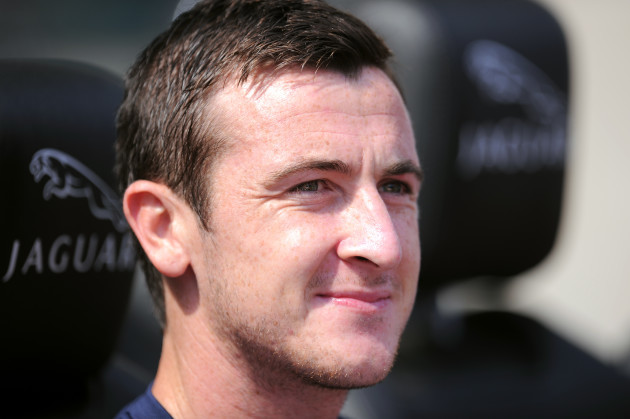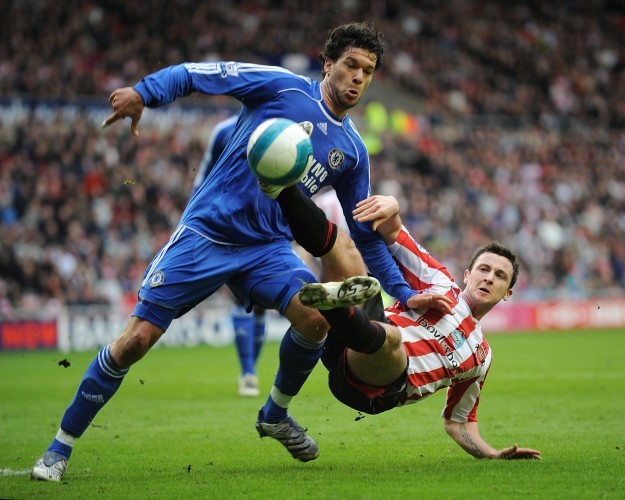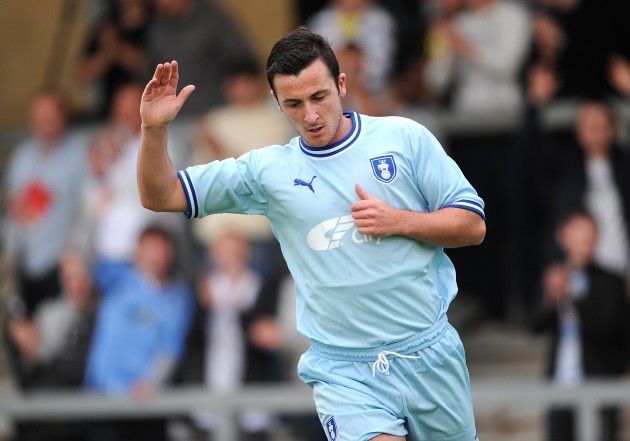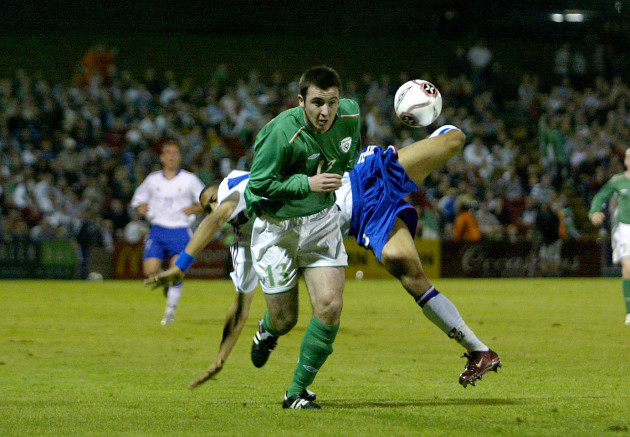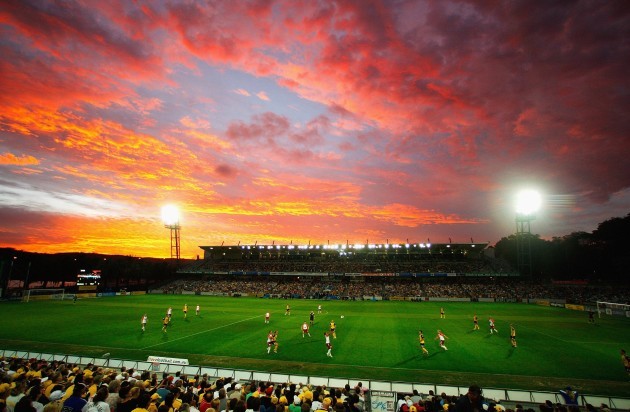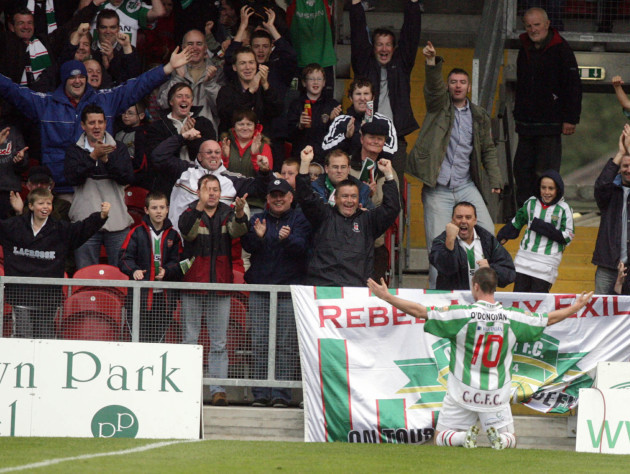EVER HEARD THE one about the Corkman who provoked the anger of the Crown Prince of Brunei?
“It closed one door and opened another,” says Roy O’Donovan, reflecting on how his time with DPMM FC came to an abrupt end late in 2014. “It worked out well because I’m very happy where I am now and things might not have turned out this way otherwise.”
Playing under ex-Blackburn Rovers manager Steve Kean and alongside former Cork City colleague Joe Gamble, O’Donovan was signed as DPMM’s ‘marquee player’ for the 2014 campaign in Singapore’s S-League. After scoring 26 times in his first season, he was offered a new contract for 2015.
But the offer was withdrawn in the off-season when O’Donovan paid a weekend visit to his friend and former Cork City team-mate George O’Callaghan, who had just taken over as general manager at Malaysian Premier League club Sabah.
“Georgie was mad for me to go and play for them,” O’Donovan explains. “He was telling me he was getting El Hadji Diouf in and he wanted me to play with him up front. But I was happy in Brunei. They were looking after me well and I was enjoying it there.
“I went over to visit George for a weekend — it’s only a 25-minute flight — and we were photographed at the airport so people thought I was after signing for them. There ended up being this big furore because it was apparently disrespectful to the Crown Prince, who owned the team, so that was the end of that.”
In May 2015, O’Donovan moved on to Australia to join Central Coast Mariners and he hasn’t looked back since. A goal in his A-League debut against Perth Glory set him on the way to ending his debut season as the Mariners’ top goalscorer — despite an eight-match ban for a headbutt — as well as winning the A-League’s 2015-16 Goal of the Season award.
Now in his second campaign with the club, which is based in Gosford near Sydney, O’Donovan has scored six times in 13 games, with his most recent goal coming in yesterday’s 2-2 draw with Melbourne City, for whom Tim Cahill opened the scoring. However, a struggling Mariners side languish just one place off the bottom of the table.
O’Donovan has spoken regularly in the Australian media of the need for the club to invest in playing personnel, but they’re hamstrung by operating on a modest budget in comparison to their competitors in the 10-team league.
At 31, O’Donovan is one of the elder statesmen in a team that’s predominantly made up of players under the age of 25. The Mariners lack strength in depth and experience, which hasn’t been helped by the injury absence of their captain, 35-year-old former Sheffield United skipper Nick Montgomery. Nevertheless, O’Donovan believes they’re only a couple of decent additions away from competing at the opposite end of the table.
Having played for eight different clubs during his seven years in the UK, O’Donovan has endured a nomadic lifestyle for much of his professional career. In Australia he has finally settled, which is something the former Irish U21 international striker hasn’t often had the luxury of.
That feeling of personal security has come at an appropriate time too, given that his wife Ellen gave birth to their son Alfie last St Patrick’s Day. Under the sunshine of the New South Wales coast is a considerably more preferable environment for raising a child than the roving existence they led between 2007 and 2014, when O’Donovan played for Sunderland, Dundee United, Blackpool, Southend United, Hartlepool, Coventry City, Hibernian and Northampton Town.
With the conditions in Australia more conducive to fluent, attractive, attacking football, the style of play has also contributed to making him feel at home away from home.
“I’m very happy to be living here and playing here,” said O’Donovan, who attracted interest from Wolves and Fulham before opting to leave Cork City for Roy Keane’s Sunderland in the Premier League in 2007 for a League of Ireland record transfer fee of €500,000.
“It’s not only the lifestyle, which is fantastic, especially when you have a young family. You’re living near the beach and the Australians are nice people, it’s a very laid-back way of life. But the football is a good challenge as well.
“The league here is good and teams play a nice brand of football. I’ve got a good, healthy balance at the moment. I’m really happy and settled. There probably haven’t been too many times in the last decade when I’ve said that and really believed it.”
He adds: “To be honest, football is almost like a different sport sometimes once you drop out of the Premier League. There aren’t a lot of managers in the modern game who have the principles of getting the ball down, playing it out from the back and through midfield on the ground.
“With a lot of the teams I’ve played for, it’s a lot of long ball and managers fighting for their livelihoods so they don’t want to take many chances, no matter how many good players they have. It’s a case of keep things tight and knock the ball long to a striker up front on his own, or see what you can get from set pieces.
“I kind of got to the stage where I was playing a lot on the wing or having to drop into midfield. I’d had a few clubs and I was getting frustrated because, no matter where I went, it was the same kind of style of football.
“In Australia, they want to play the same way as the Socceroos, the national team, so there’s a real emphasis on getting the ball down and playing through midfield. That suits me. I’m not over six feet tall, I’m not a target man, but that nice style of football tends to work well for me. The Aussies are quite physical too so there’s a good balance there.”
Despite a certain sense of unfinished business about his time in the UK, O’Donovan is adamant that he won’t be tempted to return. He proffers no excuses, but circumstances certainly seemed to place obstacles in the way of his progress there.
After falling out of favour at Sunderland following Roy Keane’s departure, O’Donovan suffered similarly at Coventry City when Aidy Boothroyd was relieved of his managerial duties. Injuries and being played out of position often held him back too.
“I’m convinced that if I’d played Roy O’Donovan more at Coventry City I’d have stayed in my job longer and we would have won a lot more games,” Boothroyd said in May 2013, over two years after he was sacked by the Sky Blues. “I should have got him in the team somehow because he’s the sort of character you need in a battle when things aren’t going for you. That was my mistake.”
If O’Donovan has one regret, it’s that he should have been more patient and less impulsive. He made decisions regarding his future based on where he was likely to benefit from more playing time — an admirable approach, but one he feels may have cost him some opportunities in the long run.
“I was always the type of player who needed to be playing. I could never just sit on my contract and take a salary. Because of that I kind of peppered my CV with loan moves,” says O’Donovan, whose most prolific spell in England came when he scored nine times in 15 League One appearances for Hartlepool United.
“In hindsight I might have been better off waiting for the next permanent offer to come in, instead of spending three months in one place and three months somewhere else. But I just wanted to play and score. I could never have been happy doing nothing with my weekends. That was never in my DNA, especially after playing a hundred games for Cork City in two-and-a-half years.
“I turned down some good loan moves for very honest reasons, which was maybe silly because I could be sitting here now with 20 or 30 Ireland caps if I had made different choices. I went to Dundee United when I could have gone to Nottingham Forest. I went to Blackpool when I could have gone to Leeds.
“If I went to Forest or Leeds my CV would have looked stronger, it’s easier to get bigger clubs after that and you’re more in the spotlight to get into the Irish team. But my thinking was always about playing as often as I could so that I could score goals and then get a chance to make an impression when I went back to Sunderland.
“But I’m happy with how my career has gone overall. I have over a hundred goals in about 300 games, which isn’t too bad for a guy who has played a lot of his career on the right wing.
“I can’t say I’d have any kind of urge to go back to England and work my way up through the ranks again. I just can’t envisage bringing my family back to the cold winters for me to try and re-live an objective like that. I’m playing here for the right reasons, honest reasons, and I’m enjoying the football.”
According to O’Donovan, the A-League has improved significantly and despite the recent presence of declining stars of the past like Alessandro Del Piero, Dwight Yorke, Robbie Fowler and Luis Garcia — who O’Donovan played alongside last season — it’s not the retirement home many perceive it to be.
“It’s after coming on leaps and bounds in the last few years,” he says. “The Aussies are the same in every sport; ultra competitive — just like the Irish — and they’ve got the best of facilities. You have to come here with the right attitude because you will get found out otherwise. It’s physical, it’s tough and it’s definitely not a retirement home, I can assure you.”
The A-League operates on a franchise model, similar to the one in place for Major League Soccer in North America. Average attendances for regular-season games for the 2015-16 campaign exceeded 12,000, including a record-high of 61,880 for the derby between Western Sydney Wanderers and Sydney FC. O’Donovan believes that the A-League could be used as a blueprint for the League of Ireland — the FAI’s “problem child”, as it has been referred to in the past by chief executive John Delaney.
“Having left there almost 10 years ago, I would have hoped that the League of Ireland would have had a little bit more support at this stage in the game,” he says. “I’m a big fan of the league but it needs backing. It needs something similar to the A-League to really kick on. Maybe it needs to be franchised and salary-capped and sponsored.
“If you look at Australia, soccer — as they call it here — is not their number one sport by any means. There’s a little bit of that GAA mentality here with regards to rugby league and Aussie rules. They’re their sports and for a long time soccer was considered the foreign game.
“It’s a little bit like what we have at home with the GAA and the League of Ireland has suffered a bit from the GAA being so successful and traditional, and then the Premier League booming in the 90s as well. People would rather go and watch Manchester United play instead of going down the road to watch a game between two terrific sides like Cork City and Dundalk.
“There’s a lot of business in Ireland, a lot of industry, big companies, and I think the FAI should really be looking at the A-League model and bringing in sponsors as sort of part-owners of the league, similar to here. I think it’s something that could really work.
“Every game here is live on television as well, which brings a lot of income. Foxtel put a lot of money into it. Ireland is a hotbed of talent and there are ways for clubs to make their money back. There are loads of ideas that I think would work for the Irish market but whether they happen any time soon is beyond me. I’d like think it could and should happen.
“At this moment in time things haven’t moved on much in 20 years. The talent on the pitch has steadily improved and so have the fitness levels, but I don’t think much else has gotten better to get people in the gates.
“The League of Ireland support is a little bit niche and I don’t think it should be because we love our soccer in Ireland. They need to look down the line at what has been done in the A-League and the MLS because it’s not their first sport either but they’ve made it work.”
O’Donovan had a successful spell at Cork City and he remains — much to his annoyance as a supporter of the club first and foremost — a member of the last City team to win the League of Ireland Premier Division in 2005. Dundalk have denied the Leesiders in each of the last three seasons, which has almost been enough to convince O’Donovan to throw his weight behind John Caulfied’s side’s bid to end that drought. Almost.
“I was home last summer and I actually went to watch Cork City versus Dundalk,” says O’Donovan. “It was great to see a full Turner’s Cross. The stadium has come on leaps and bounds. There was a great atmosphere, City won on the night and I thought it could be the year they break their duck and win the league.
“You definitely get those feelings and that itch but what would turn me off right now would be the thought of going up to the Carlisle Grounds on a Tuesday night to play in front of 400 people. For me that wouldn’t be a forward move.
“It’s brilliant playing at a full Turner’s Cross. If every game in the League of Ireland was like that, if players were getting their wages 52 weeks of the year and the profile was there, it would become a lot more attractive for lots of players. Not just for the likes of myself, but fellas from England and maybe foreign coaches and things like that. Things like that would give it a little bit of hype.
“I think the League of Ireland could be an absolute winner if things were done properly. But I’m not sure it’s going to happen any time soon unfortunately. It’s frustrating.”
He adds: “At the moment I’m very happy but you can’t make too many plans in football because things can change very quickly. I’m very focused on the A-League for now and I’m enjoying the challenge. I’m enjoying living here and the style of football, and I’d like to score more goals here and win some trophies.
“Who knows what the future holds but I’m not really looking beyond that at the moment. I keep my eye on Cork City’s results. It’s a club that’s very close to my heart and that’s always in the back of my mind somewhere.”
A return to Cork City might be a long-term possibility for O’Donovan, but his immediate future is in Australia — so he might want to make sure there are no photographers around if he bumps into John Caulfield when he’s back home next summer, just to be on the safe side.
